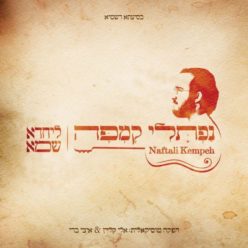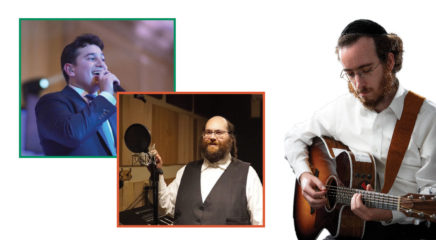Twelve years ago, Naftali Kempeh was a young bochur in Yeshivas Kol Torah. In the cracks between sedorim, he was learning to play guitar, strongly drawn to Shlomo Carlebach’s music. Strumming a Carlebach tune on his bed one day, the budding guitarist played an A-minor, then a G. Suddenly, a shout issued from a nearby dorm room: “No, should be an E-minor!” The correction came from Yitzy Berry, a bochur a few years older, who had grown up on music and had just begun to develop his own considerable musical talents. To Kempeh, it felt like high praise.
“I don’t even remember correcting his chords,” Berry says of that incident, “but slowly, my good friend Eli Klein and I got to know Naftali, and we’d occasionally play music together.” Later, Klein and Berry watched as their young yeshivah friend became more professional and his reputation as an Israeli Carlebach-style singer grew. Today, Kempeh is a popular kumzitz performer, sought after by yeshivos and boys’ camps all over Eretz Yisrael.
Working on Kempeh’s newly released L’yachada Shema as a threesome was a change of pace for Berry, who arranged and produced the debut album together with Eli Klein. “Naftali’s style is somewhat different than that of most of the artists we work with. The music has no agenda to be current or develop into the newest wedding hits, so we didn’t have today’s competitive pressure. There’s no pop, nothing brash or post-modern about the songs — instead, the music has an airy kind of feel. We also took the production slowly, making music for the sake of music, not business.”
If you’re used to loud, floor-shaking music, you’ll feel your heartbeat slowing down when you listen to the new album. Ten of the songs are Kempeh’s own, while the other two are little-known Carlebach compositions — one of those is an entrancing niggun with just four words, “Ani maamin be’emunah sheleimah.” Kempeh’s tunes are calming and laid-back, and his voice has a soothing quality. One song that has already become a favorite is “Kol Hanechalim,” which Kempeh wrote several years ago right before his wedding, inspired by the words of Shlomo Hamelech (Koheles 1:7), when he and some friends were sitting on the bank of the Jordan River. “Kol hanechalim holchim el hayam, all rivers flow to the sea,” Kempeh sings, and then invokes the end of Koheles, “Sof davar hakol nishmah, es haElokim yirah — the only thing that matters in the end is keeping Torah and mitzvos.” The track, accompanied mainly by guitar and the sound of rushing water, is both reflective and catchy. It’s easy to imagine a late-night circle around a campfire or at a Leil Shishi gathering — singing another round of the compelling chorus, “Sof davar hakol nishmah” and yet another.
(Originally featured in Mishpacha, Issue 736)





